| Reviews & Columns |
|
Reviews DVD TV on DVD Blu-ray 4K UHD International DVDs In Theaters Reviews by Studio Video Games Features Collector Series DVDs Easter Egg Database Interviews DVD Talk Radio Feature Articles Columns Anime Talk DVD Savant Horror DVDs The M.O.D. Squad Art House HD Talk Silent DVD
|
DVD Talk Forum |
|
|
| Resources |
|
DVD Price Search Customer Service #'s RCE Info Links |
|
Columns
|
|
|
Dr. Kildare: The Complete Third Season, Part One & Two (Warner Archive Collection)
"Hey, doctor, when you decide to put down that stethoscope and start... 'operating,' give me a call...."
Prescription refill. Warner Bros.' Archive Collection of hard-to-find cult and library titles has released Dr. Kildare: The Complete Third Season, Part One & Two, a 2 volume, 8 disc, 34-episode collection of the NBC hit medico's penultimate 1963-1964 season. Like all good television from the 1960s, the "repeatable experience" is in full force by this third season of Dr. Kildare, with professionally written, directed, and performed little mini-dramas delivered week after week, like clockwork. The only thing different this season? Dreamy Dr. K. is now chief resident under Dr. Gillespie, with more autonomy to stick his nose into other people's private business--and with those "other people" being some of the best supporting actors working in television and movies at that time (...and just maybe a few of the episodes aren't as strong as last season's). Another "hidden" gem from television's past, brought back to life for fans and historians by the Archive. No extras, unfortunately, for these pristine black and white fullscreen transfers (the WB can't scrounge up a couple of bucks and get Chamberlain to give an episode commentary or two?).
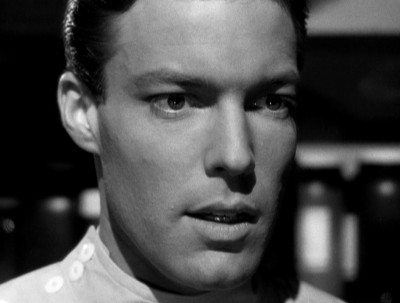
Mammoth, bustling Blair General Hospital. At the center of this modern metropolitan citadel of healing sits Dr. Leonard Gillespie (Raymond Massey), Chief of Staff at Blair. Brilliant, demanding, and fearsomely intimidating to those who only see the surface, Gillespie also possesses the wisdom of the just and kind--a tool of the heart that is as formidable as his scientific abilities, and one that he uses quite often with young Dr. James Kildare (Richard Chamberlain). Kildare, now Chief Resident at Blair, shows all the signs of becoming the most skilled internist Gillespie has ever taught...that is, if eager, impetuous young Kildare can avoid the myriad pitfalls that can waylay any young doctor who cares too much. Kildare isn't the only resident on Blair's staff; from week to week one might see Drs. Simon Agurski, Yates Atkinson, Thomas Gerson, and John Kapish (Eddie Ryder, James T. Callahan, Jud Taylor, and Ken Berry), but their often flip attitude and casual job involvement is in sharp contrast to Kildare's almost holy dedication to the science of medicine. Good thing, too, because the varieties, complexities, and severities of the illnesses that wind up at Blair, and specifically when Kildare is attending, are staggering.
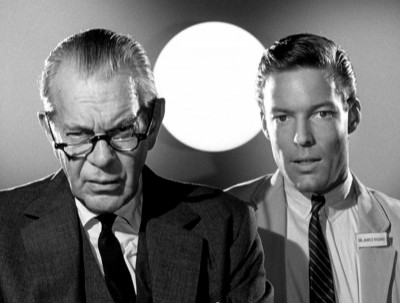
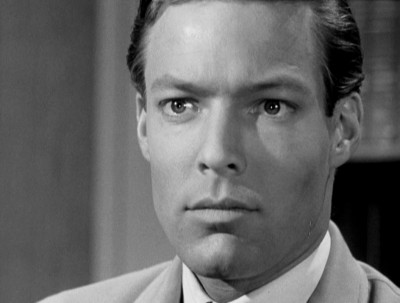
Having reviewed the second season of Dr. Kildare back in January, I covered the show's inception and aesthetic concerns quite extensively, so I won't waste space going over the same ground here...mainly because season three, as well, trods the same ground as season two--and expertly so, I might add (you can read that review here, for more detailed background on the series and its aims). Let's dive right into the episodes.
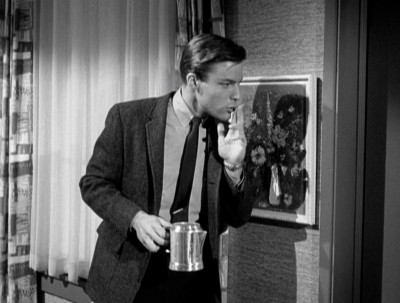
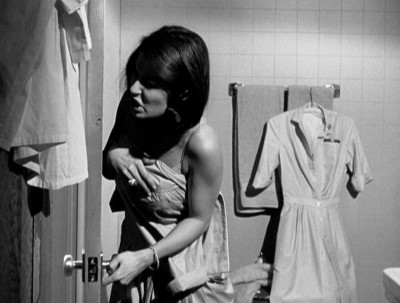
The minute you hear Charles Bronson blowing off the prospect of dying ("It's like complaining that the merry-go-round doesn't go around five more times!"), you know he's getting a death sentence in Who Ever Heard of a Two-Headed Doll?, from scripter Jerry McNeely. Good work from Bronson (he cries) and especially the delectable Janice Rule in a brassy-yet-sensitive turn (but jesus is new intern Steven Bell annoying as hell--no wonder he's only around for a few more scattered episodes). This one's about whether doctors should or shouldn't tell patients about terminal diagnoses (can they even do that today?), as well as detailing Dr. K's graduation to Resident (this marks an even closer, more colleague-to-collegue dynamic for Gillespie and Kildare, as the series progresses). Donald Sanford's The Good Samaritan is reminiscent of the cinematic The People vs. Dr. Kildare; here, Dr. K's efforts to delivery a roadside baby results in a malpractice suit. I can do without liberal Hollywood screenwriters always portraying "colorful" country folk as superstitious bumpkins, but a roster of top notch supporting players--Ruth White (really nasty here), Leonard Stone, Paul Barselow, Rhys Williams, the always dependable John Anderson--help sell this tense courtroom episode, directed by Elliott Silverstein (Thomas Gomez scores big in a meaty role as the wily defense attorney). Massey gets to deliver Shakespeare ("My thought for the day comes from Henry VI, Shakespeare: 'First thing we do: let's kill all the lawyers,'" he snarls at Gomez), and the case is believably resolved. One of the few outright comedic Dr. Kildares this season comes in Irene Winston's bright, amusing If You Can't Believe the Truth..., where Southern slice of deep dish peach pie nurse Barbara Eden immediately makes all the other nurses hate her guts, and all the guys start panting like wolves (I would guess it's that absolutely insane body of hers). Gilligan's Island's Bob Denver shows up as a laid-back intern, while Dr. Ken Berry returns to sexually assault kiss a resisting Eden in a linen closet (remarkable how times have changed; here, Eden brushes off his aggressive come-on with a "mama spank" dismissiveness). She eventually winds up with millionaire James Whitmore, who's more than happy to get her just because he's rich (the script is refreshingly honest about their relationship). Tele-conferencing is introduced like it's science-fiction, Chamberlain can't close the deal with Eden (no surprise there) and the supremely talented Gillespie disgustedly snorts when the word "osteopath" is dared mentioned in his presence (hilarious).
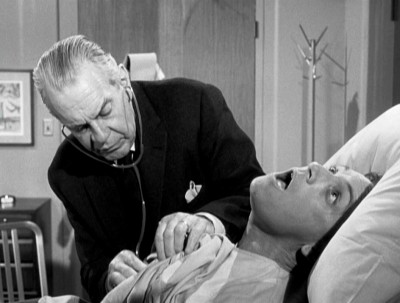
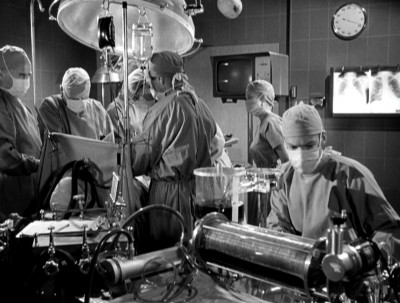
I simply refuse to believe there's a world where the divine Diane Baker would have married obsessed heart/lung machine doctor/inventor Pat Hingle, but she did, in The Heart, an Imperfect Machine, from Dick Nelson. The best part of this otherwise unconvincing outing is a twitchy, big finale surgery sequence--under the knife of a growling Charles McGraw--well directed by Robert Butler (Baker, one of the most underutilized actresses from the 1960s, is wasted yet again in a nothing role). Director Paul Wendkos keeps things simple in Jerry McNeely's A Game for Three, a nicely-performed story of a too-slick doctor, Andrew Prine (another often ill-used performer), who'll go so far as to manipulate his wife, Susan Strasberg, into implicating Kildare in a non-existent affair to further his career (Wendkos gets some good close-ups during Prine's final, humiliating descent). Future Columbo scribes Richard Levinson and William Link deliver up the powerful The Exploiters, detailing how funeral parlors prey on survivors' grief to line their pockets (good detail on how the various scams work, originating right at the hospital, where staff start the ball rolling by tipping off the funeral homes...for money). Watch Chamberlain helplessly turn green for a second when, notified that Kildare might have a secret admirer, Eddie Ryder cracks, "Well...ask the obvious question: male or female?" The two best things about Margaret and Paul Schneider's message-y One Clear, Bright Thursday Morning is Miyoshi Umeki's beautifully realized portrait of a pregnant Japanese wife discovering she has leukemia (she was from Nagasaki), and Leonard Horn's sensitive direction (when husband James Shigeta goes to a cathedral to light a candle for his newborn baby...another candle blows out). In Theodore Apstein's and Sidney Model's facile The Eleventh Commandment, Susan Oliver is disgusted by roommate Molly Picon's clingy neediness--a quite sensible reaction considering Picon's unashamed overacting (I know Picon's an icon...but oy vey is her shtick grating). Series' best Four Feet in the Morning, from Jerry De Bono, has a rather remarkable opening from director Jack Smight: Leave it to Beaver's Tony Dow takes Lost in Space's Marta Kristen to the drive-in picture show, where a beach party movie is playing. As the teens watch the actors make safe "movie love," they mimic what they see on the screen, before we get a shot of Tony shoving his key into the ignition...followed by a jump cut to Marta crying, "I'm sorry, Daddy! " A systematic nightmare of an episode, the depiction of Dow's supremely unhappy home is quite different than the more commonly depicted idealized nuclear family of 60s television (Ruth Roman, sick of angry/frustrated husband/drone Andrew Duggan always working, and tired of the drudgery of keeping a clean house, is this close to flipping out of her "perfect" lifestyle). And check out Gillespie's indictment of "perfect family" matriarch Phyllis Avery, whom Gillespie carefully destroys when he runs down how she's groomed her now-pregnant daughter for seduction. A really harrowing episode that apparently is the first of a two-parter, which is later "resolved" on an episode of companion NBC medico series, The Eleventh Hour, with Ralph Bellamy (it needs no resolution: the shot of destroyed Dow, realizing his baby is going to be given away, is all the resolution this fine episode needs).
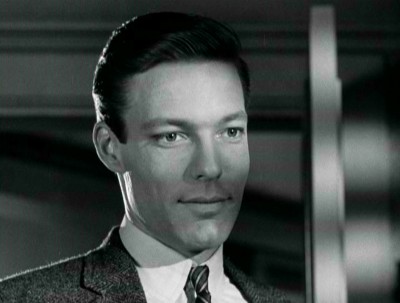
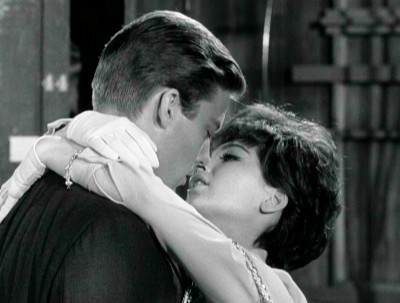
Scribe James Gunn turns in an entertaining episode, The Pack Rat and the Prima Donna, where entitled hot shot Ed Nelson wages war on starchy supply officer/pack rat Celeste Holm, with (who else) Dr. K in the middle. The story is predictable, but it's quite enjoyable (I'm convinced the writers were including stealth in-jokes about Chamberlain's orientation: here, red-hot French nurse Danielle De Metz lets extremely awkward Chamberlain down with, "You want a buddy, not a sweetheart," with Chamberlain looking like he wants to jump through a window when he hears that line). The grim The Backslider, from Archie Tegland, finds smooth Kevin McCarthy giving poor medical advice to his patients, with Dr. K on to his incompetence. A good rundown of the procedural, legal, and ethical challenges faced when trying to get rid of a bad doctor, with series regular director John Newland keeping things moving along at a fast clip (the script doesn't pull any punches: when Anne Helm dies from meningitis--which McCarthy misdiagnosed--Newland goes in for a graphic close-up as she breathes her last breath...and the lights go out). While I was intrigued by the take scripter Jerry McNeely took for Charlie Wade Makes Lots of Shade, about the humiliations and battles the severely overweight suffer...it was difficult to sympathize with the character as portrayed by Dale Malone, who comes over as alternately weakly petulant and weirdly threatening (check out how scared those kids look at his overacting when he tells a story in the kids' orthopedics ward...). The excellent Frank Overton is totally wasted here in a do-nothing part, while Marion Ross is quite good as a snooty, disgusted nurse. Recently passed Lauren Bacall is excellent (as usual) in Gene Wang's The Oracle, where political journalist Bacall learns she has M.S. (the script is unusual in that Bacall achieves no magical transformation of spirit at the end--a Dr. Kildare specialty: she remains bitter and closed off at the close-out; it's fellow sufferer Brenda Scott who comes off as the "better" person). Levinson and Link return with director Paul Wendkos for the excellent A Vote of Confidence, which details Dr. Gillespie's difficult re-election campaign for Chief of Staff, due to ambitious, aggressive surgeon Eddie Albert. A fine delineation of office politics, A Vote of Confidence is a welcome departure from the usual "terminal patient finds spiritual release" that dominate the series (familiar face Frank Aletter walks off with the acting honors here--no mean feat considering who he's up against--with his slimy, opportunistic underling, switching allegiances whenever the wind changes).
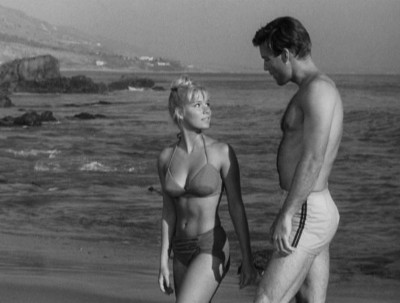
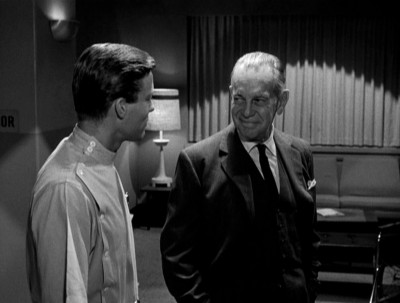
Harold Gast's A Willing Suspension of Disbelief has an interesting subtext (that's not developed enough) about ex-footballer-turned surgeon Jack Lord's battle with arthritis: the subplot of him getting hooked on speed is good, but I would have liked more about his resentment towards the Ivy League doctors who think of him as an interloper. Denver Pyle's fine as the "dealer." Certainly one of the best-remembered episodes from Dr. Kildare, the two-part Tyger, Tyger, from Ben Masselink, finds Dr. K falling in love with epileptic surfer Yvette Mimieux, who is "one with the sea," and who would rather surf than play it safe with her life (she describes her episodes as, "I kept getting bummed out...like a kook,"). Inbetween the beach party lovemaking, Gillespie gives Dr. K some fatherly advice: "Jim, don't try and tell people how to live or die...don't interfere with nature." Phyllis Hill doesn't put on a bikini, but Yvette does--often (whoa ho ho nelly!). Quite touching at times (and probably shocking to the young girls watching, when Yvette suffers her seizures), while the ending is genuinely poetic (if only they would have toned down the schmaltzy music a little). Little Joey Scott walks away with the quiet, sad Never Too Old for the Circus, from Jameson Brewer, not because he's annoyingly precocious or a phony firecracker like so many kid performers, but because he's so believably low-key and sweet, he breaks your heart when he tearfully tells retired surgeon and grandfather Walter Pidgeon (who's too busy to spend time with his grandson any longer) that he doesn't want to grow up and "be a man"...if that means no more hugs and kisses, and no trips to the circus (Pidgeon is excellent, too). Perfect performances here. Old pro Cesar Romero is the whole show in Theodore Apstein's too familiar Onions, Garlic, and Flowers That Bloom in the Spring, where Dr. K spends some time helping out at Romero's low-income clinic (good to see skilled Romero do something that doesn't require him flashing that ridiculously handsome, perfect smile). Ida Lupino, in the director's chair, gets a terrific performance out of Gene Rowlands in Joy Dexter's affective To Walk in Grace, where author Rowlands learns she has aplastic anemia (not only is Rowlands quite subtle and "alive" here...she looks impossibly beautiful). Scripter Irene Winston is back with another comedic outing in the kooky, quirkily structured Goodbye, Mr. Jersey, where free spirit Suzanne Pleshette (at her dishiest and most charmingly attractive) somehow matches up an injured dog and undercover millionaire J. Patrick O'Malley. There's a very funny send-up of TV commercials here, as well as plenty of throwaway bits (the sponsor, played by Hogan's Heroes' John Banner, is called "Schultz," and the "The Man in the Hathaway Shirt" even shows up). Even Gillespie gets into the spirit of the soon-changing times: when sexy Pleshette blows him a kiss, he takes a judicious look over his spectacles at her departing rear end, and states, "I don't know where this younger generation is going...but there are times when I feel like making the trip. " Amen, Dr. G.
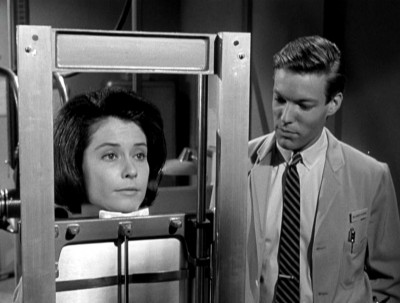
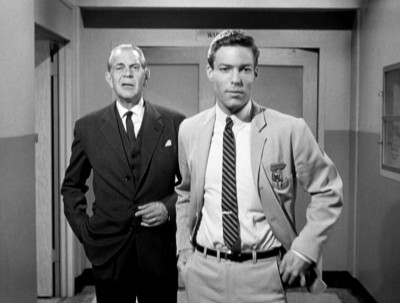
Far less successful is Calvin Clements' too-strident, too obvious Why Won't Anybody Listen?, where a failing Claude Rains (he seems quite unsteady, outside of his characterization) becomes a mad bomber when he thinks the Blair staff doesn't "care enough" about the death of his little granddaughter (the abrupt ending is unintentionally hilarious, due to Gillespie's and Kildare's largely nonplussed reactions). Scripter Phillip Saltzman's The Child Between benefits from a solid turn by Beau Bridges as a disaffected youth with diabetes, smothered by his divorced mother Jeanne Cooper (as unconscious rebellion, he risks his life by not taking his insulin shots). Too bad the resolution is a little too neat. Speaking of which...A Hundred Million Tomorrows, from Jerome Thomas, might have been a sobering little Executive Suite knock-off, had the producers let right-hand man George Grizzard really ace bulldog Paul Burke out of his job as head of an oil company, when Burke has a series of heart attacks (I've always liked the underrated Burke...but he's a little too jarring here). Slimy Dennis Patrick, however, is terrific as a ghoulish business reporter. Sal Mineo, clearly on a downward career trajectory (just three years earlier he was up for an Academy Award in Exodus), shows up in Tomorrow Is a Fickle Girl, from James F. Griffith, a potentially interesting episode about boy Mineo practicing medicine without a license (Mineo's too earnest turn smacks of desperation, not sincerity). Much better is Archie Tegland's increasingly anxious Quid Pro Quo, where Robert Walker, Jr. (excellent), on the verge of flunking out, can't handle the influence of his jive-ass roommate, the cocky, gifted, but irresponsible Michael Callan (a shocker ending for this one that strangely resonated, considering the Robin Williams suicide that was grotesquely lauded by so many this week). Anne Baxter hams it up something good in Calvin Clements' A Day to Remember, where she kidnaps sick little Michel Petit (hasn't he been hanging around that hospital for a few seasons?) and takes him to the carnival (the Tilt-a-Whirl can kill you...). Batman's Yvonne Craig is Michel's irresponsible, irrepressibly busty mother. Clements is back again for the superior An Ungodly Act, where a debate over for-profit hospitals refusing service to poor patients is explored to good effect. Douglas Fairbanks, Jr., yet another actor never given his proper due, is spot-on as the confident, polished, wily owner of the hospital, who acts as his own (quite skilled) attorney.
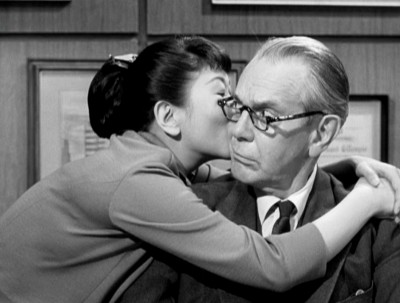
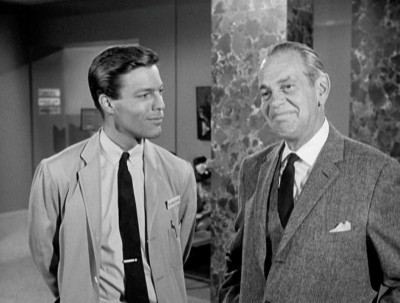
Flat-out one of the most touching hours of drama I've seen from 1960s network television comes in Agnes Ridgway's A Nickel Worth of Prayer, a beautiful, heartbreaking outing starring that most versatile Ed Begley (he could do immense evil, or the kindest warmth). This time, he's a dying ex-handyman with no one in the world...until he gets a birthday card from 14-year-old Kim Darby, who used to live in his apartment building. Darby's home life is harsh (Lola Albright, in another terrific performance), and Begley offers sage advice about staying in school, to avoid what happened to him, and to her harried mother. Darby is remarkable as the lonely girl who's tired of being poor; her scenes with the giving, wise Begley, I'm not ashamed to admit, gave me a lump in the throat, they were that well written and performed. A lovely outing I haven't stopped thinking about all week. Night of the Beast, from Richard Fielder, is an exceedingly harsh outing for the series: on a date with Dr. Carol Eve Rossen, Kildare is held down while she's gang-raped by psycho Bradford Dillman and his gang (including AIP alum punk, John Ashley). It's all to make sure Kildare never forgets he insulted Dillman at the hospital, when Kildare looks down upon Dillman's treatment of bennies-popper Sharon Farrell. Listen to liberal, understanding Dr. K, when Dillman explains that he's the way he is because Daddy didn't love him enough: "I don't want to hear about your father or mother. Or watch you crawl around begging for sympathy. You whimper and you whine about poor little Tony lost in the big, cold world where life is a cheat and The Bomb is all and 'Three Cheers for Zero!' It's too late to save you, no matter how many convenient excuses the psychiatrists come up with for your wasted, idiotic life!" (God, America used to be a hell of a place to live...). To its credit, the episode ends as it should, with unrepentant Dillman smiling broadly at Dr. K, brightly offering, "You'll never forget!" The Middle of Ernie Mann, from Margaret and Paul Schneider, is a pretty standard boxing tale, with the medico angle sewn on, but it does sport two very effective performances from Terry Carter and Ellen Holly. Don Balluck comes up with a winner in A Sense of Tempo, featuring the marvelously arch and funny Cyril Ritchard playing an author checking into Blair to die...because something tells him his time is up (when quite mature Jeanette Nolan, who has real ESP, saves his life from a bolt of lightning, Ritchard manages, from his gurney, to offer her the spot of "flower girl" at his wedding to the delicious Pat Crowley. I miss skilled artists like Ritchard; you won't see their like again). Not many surprises in Edward J. Lasko's Speak Not in Angry Whispers, except for two stand-out performances from underrated actors Lois Nettleton and Gerald S. O'Loughlin as mismatched high school sweethearts nearing the end of their marriage (director Leo Penn comes up with a jangly opening montage, showing Nettleton flipping out in her room, that's memorable). And finally, the smart, crackling Dolly's Dilemma, from Ken Kolb, finds old pros Joan Blondell and Chester Morris sparring at Blair before finally agreeing they're meant for each other. Lots of comedy as Gillespie dodges rich widow Blondell's advances (when she swoons that she'll darn his socks, he squeals, "What an appalling idea!"), inbetween the expert, slangy verbal jabs from Morris and Blondell--like something out of an old Warners B comedy (you'll never see the caliber of these kind of pros again, either).
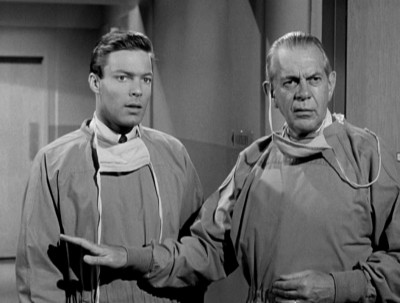
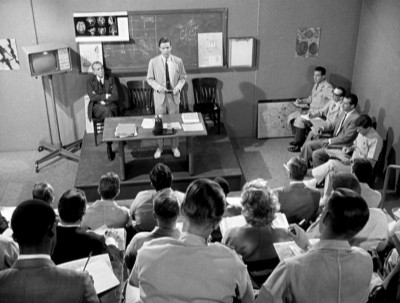
Ratings continued to tumble for Dr. Kildare at 8:30pm on Thursday nights, in this next-to-last season...although it was still popular enough to land in the vaunted Nielsen Top Twenty most popular shows on the air. Given another ill-fitting Western lead-in this season--Jeffrey Hunter's failed Temple Houston, from producer Jack Webb--Dr. Kildare no doubt lost family lead-in shares to ABC, where the surprisingly potent combo of The Flintstones at 7:30pm, The Donna Reed Show at 8 (pulling in a hefty 16th ranking for the year), and My Three Sons (27th) at 8:30 grabbed viewers, some of whom then switched over to CBS for Perry Mason (26th) at 9:00pm, rather than catch the last half hour of Dr. Kildare. Lead-out Hazel was still strong at 22nd for the year, but it was failing, too, for NBC. Next season, all it would take was a little twitch of the nose from Elizabeth Montgomery, to suddenly flat-line Dr. Kildare....
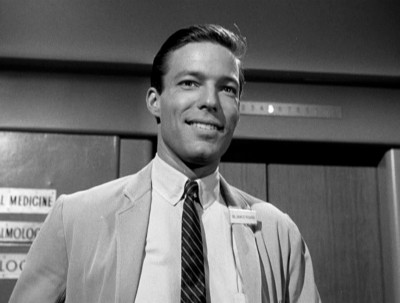
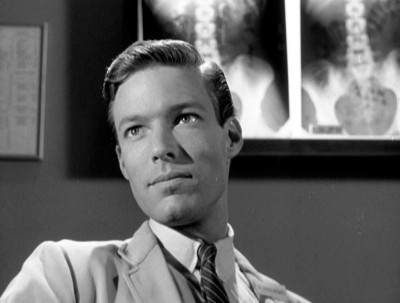
The Video:
As is usual with these Kildare seasons, Dr. Kildare: The Complete Third Season, Part One & Two's fullframe, 1.37:1 black and white transfers are quite sharp, with solid blacks, good contrast, and few imperfections. Nice.
The Audio:
The Dolby Digital English mono audio track is relatively clean, with little hiss. No subtitles or closed-captions.
The Extras:
No extras for Dr. Kildare: The Complete Third Season, Part One & Two.
Final Thoughts:
Just what the doctor ordered: more expertly-crafted mini-dramas, with some of the best people working in television at the time. If a few episodes of Dr. Kildare: The Complete Third Season, Part One & Two aren't up to par with the previous season's...they're still way ahead of a lot of crap on television today. Must-viewing for the vintage TV drama fan. I'm highly recommending Dr. Kildare: The Complete Third Season, Part One & Two.
Paul Mavis is an internationally published movie and television historian, a member of the Online Film Critics Society, and the author of The Espionage Filmography.


|
| Popular Reviews |
| Sponsored Links |
|
|
| Sponsored Links |
|
|
| Release List | Reviews | Shop | Newsletter | Forum | DVD Giveaways | Blu-Ray | Advertise |
|
Copyright 2024 DVDTalk.com All Rights Reserved. Legal Info, Privacy Policy, Terms of Use,
Manage Preferences,
Your Privacy Choices | |||||||














